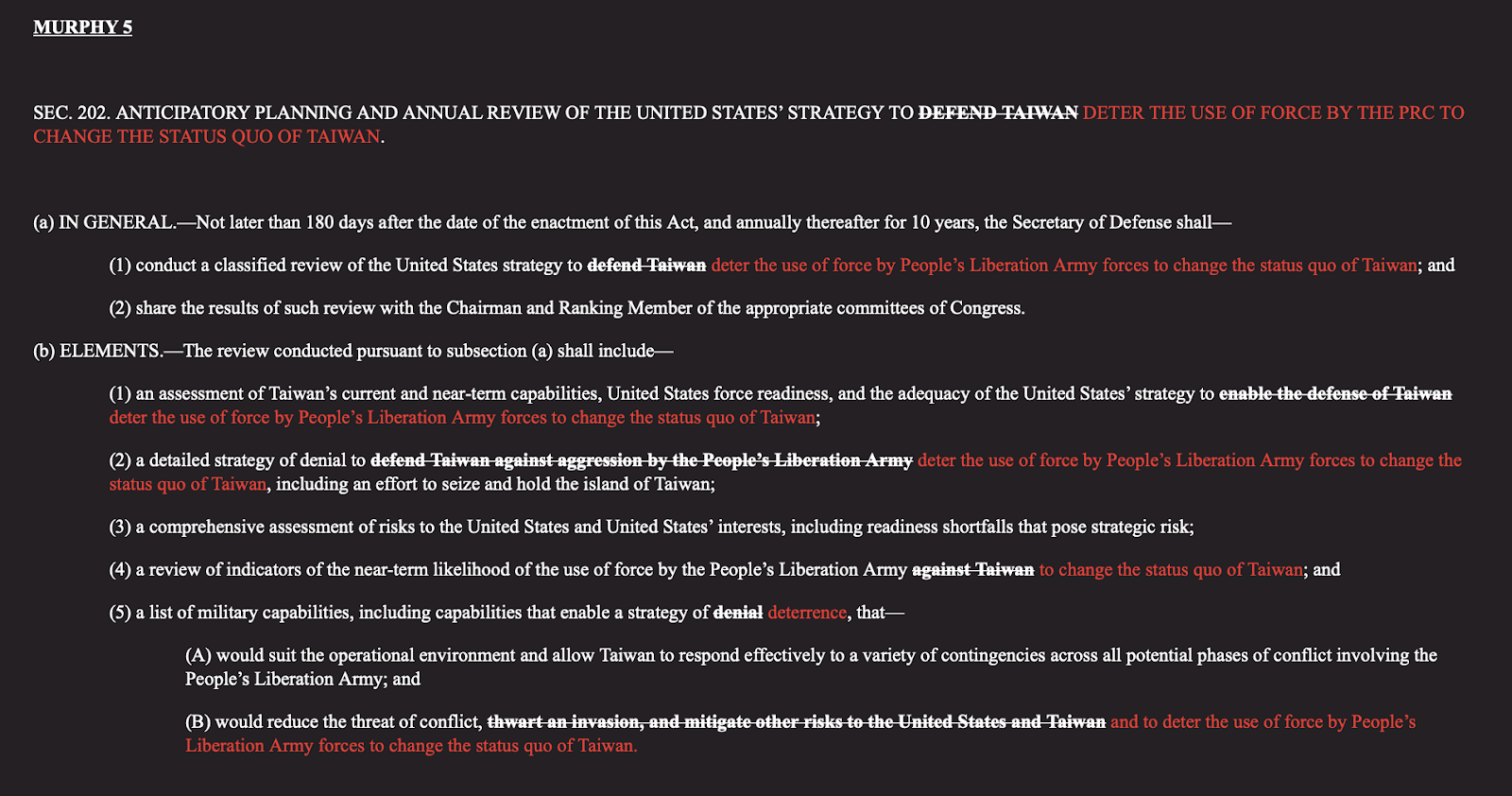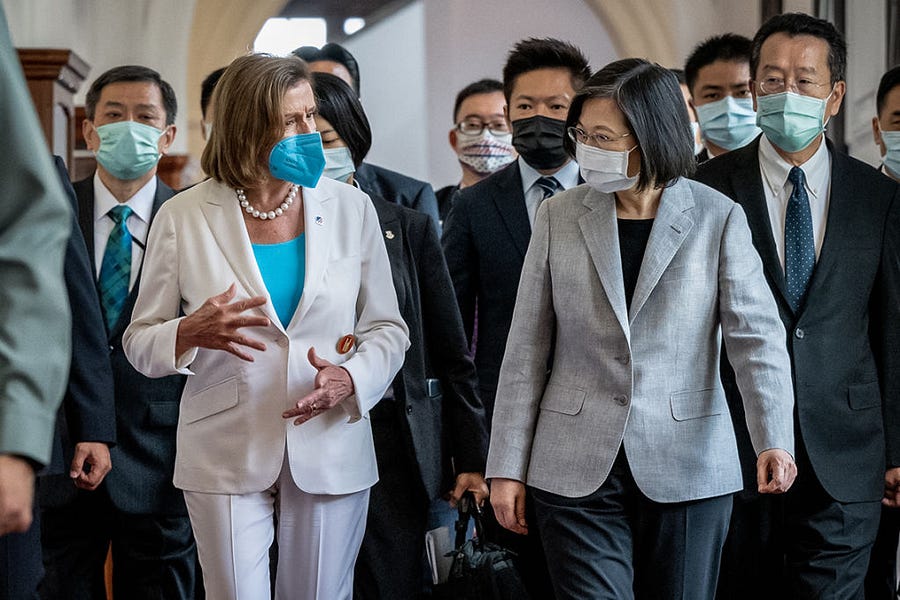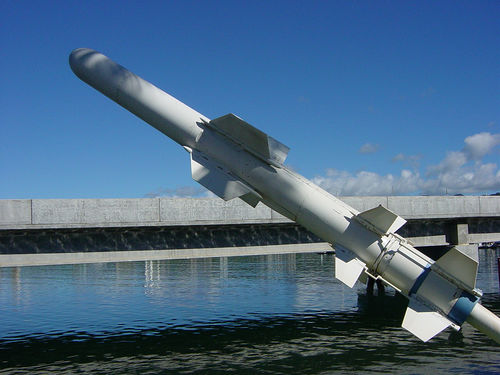We’re praying for the families of Indiana Rep. Jackie Walorski, Emma Thomson, and Zachery Potts, who were killed in a car crash this week.
Taiwan Policy Sets Top Lawmakers at Odds With White House
Since taking office, President Joe Biden’s administration has repeatedly urged Congress, in public and behind closed doors, to tone down its confrontations of China. On a range of issues, from addressing forced labor to House Speaker Nancy Pelosi’s trip to Taiwan this week, lawmakers from both parties have disregarded the White House’s notes of caution.
The dynamic solidified throughout the first year and a half of Biden’s presidency, as members of both parties have overwhelmingly rallied around tough-on-China policies. Those stances are fueled by Beijing’s increasingly belligerent behavior and its long record of human rights abuses, which have ramped up in recent years. China is perpetrating a genocide of ethnic minorities in Xinjiang, oppressing the people of Tibet, and systematically dismantling freedom in Hong Kong—at the same time it is making heightened threats against self-governing, democratic Taiwan.
The latest arena for a clash between Capitol Hill and the administration: an overhaul of Taiwan relations championed by leading senators who want to boost American support for the island.
Congressional sources confirmed the Biden administration and top lawmakers are at odds over the Taiwan Policy Act of 2022, which would authorize $4.5 billion in security assistance to Taiwan, designate it as a major non-NATO ally, and elevate it within international institutions. The White House is worried stronger language about Taiwan’s status would undermine America’s existing balance on Taiwan, which Beijing claims as part of China.
Bloomberg’s Jenny Leonard and Erik Wasson first reported the White House’s misgivings on Wednesday night, based on comments by Connecticut Democratic Sen. Chris Murphy.
“The White House has significant concerns,” said Murphy, a member of the Senate Foreign Relations Committee.
The White House did not respond to The Dispatch’s request for comment on the legislation. In a statement to Bloomberg, the National Security Council said the administration takes issue with elements of the bill that “would contradict and undermine the United States government’s longstanding one China policy.”
One portion of the legislation would block any restrictions on bilateral relations between officials from the United States and their Taiwanese counterparts. It would also elevate the language used for Taiwan’s diplomatic presence in Washington D.C., changing it from the Taipei Economic and Cultural Representative Office to the “Taiwan Representative Office.”
It would further require executive agencies to “end the outdated practice of referring to the government in Taiwan as the ‘Taiwan authorities.’” The bill attempts to sidestep fears that these changes go beyond America’s existing one China policy, stating that nothing within it can be construed to change the American government’s position regarding the international status of Taiwan.
Murphy, the Connecticut senator, has his own problems with the measure: According to amendment text obtained by The Dispatch, he planned to introduce changes to make some of its language more ambiguous regarding whether the United States would defend Taiwan in the event of an attack by China. A section of the proposal calls for the Defense Department to conduct a classified review of the U.S. strategy to defend Taiwan. One of Murphy’s amendments would have changed that language to instead mandate a review of the strategy to deter the use of force by the Chinese military, among other similar tweaks:

American leaders have for decades maintained a policy of “strategic ambiguity” about whether the United States would come to Taiwan’s defense if attacked by China. Experts say the Taiwan Policy Act of 2022 as written wouldn’t completely erode strategic ambiguity, but it would signal more clearly where Congress stands on the matter.
“The legislation makes it clearer, if not crystal clear, but clearer, that Congress at least sees a U.S. commitment to do so,” said Michael Mazza, an American Enterprise Institute expert in Asia policy, defense, and Taiwan relations.
Mazza told The Dispatch during a phone interview Thursday that he understands caution by the Biden administration amid a dangerous moment in the Taiwan Strait this week, and he acknowledged that the Chinese government would not react well to any of the bill’s components. On the other hand, he said, if the United States’ ultimate goal is to “ensure Taiwan’s continuing de facto independence, its existence as a democracy,” then the bill may be the right approach.
“It does sort of address the ambiguity in the United States’ position on what Taiwan is,” Mazza said. “And I think that is important. If the United States continues to treat Taiwan as a sort of quirky relic of the Cold War, an unsettled matter, I think it makes it a lot harder to make the case to the American people that no, this is actually an independent democracy where the United States has key national security interests, and those interests need to be defended, perhaps with force.”
The Taiwan bill would have been a major topic of debate Wednesday if the Senate Foreign Relations Committee had met for its previously scheduled markup of the legislation. That meeting was instead postponed at the last minute. If the committee had gone ahead with the markup, members were poised to approve a version of the bill to send it to the full chamber for consideration.
One Democratic Senate source familiar with the situation told The Dispatch the schedule change was not related to the White House’s concerns, but it came because committee chair Bob Menendez—who is the lead sponsor of the Taiwan support bill—had to manage Senate floor debate on an unrelated measure Wednesday night to allow Finland and Sweden to join NATO.
The Foreign Relations Committee is planning to reschedule the meeting for September, the source said, after members return to Washington, D.C., from a month-long recess.
The committee’s Democratic spokesman did not answer The Dispatch’s questions Thursday about whether any Biden officials asked the panel to delay the meeting. The White House separately did not respond to the same question.
Republicans raised alarms about the delay. They pointed out that with the Senate awaiting action on Democrats’ climate change and drug pricing package over the weekend, members of the committee have more than enough time to convene and debate the Taiwan bill before the August recess.
“Many of us are ready to mark up the Taiwan Policy Act today,” Idaho Sen. Jim Risch, the top Republican on the panel, tweeted Thursday morning. “The White House has done enough damage on Taiwan policy, and continues to add to it this week. It should not interfere in the legislative process.”
South Carolina GOP Sen. Lindsey Graham, the lead Republican sponsor of the Taiwan legislation, called the Biden team’s hesitancy “a miscalculation of how to keep the world in order.”
“At every turn, they take the weakest path,” Graham told Bloomberg. “If you put this on the floor of the Senate, it would pass overwhelmingly.”
Republicans can’t help but notice a trend.
First, senior Biden administration officials quietly lobbied lawmakers last year to water down the most substantial American response to the genocide in Xinjiang to date, the Uyghur Forced Labor Prevention Act. The Biden team has said human rights in China are a priority for the president, but officials have tried to balance that with other goals, including increased cooperation on climate initiatives.
Congress ultimately passed a strong version of the forced labor law despite pushback from the White House.
Then, the administration overlooked several major solar companies implicated in forced labor in its implementation of the forced labor law. A handful of Democratic lawmakers responded last month, urging the administration to include those entities and to not let climate priorities override forced labor implementation.
The White House’s tension with Capitol Hill in its approach to China came back into focus last month after Biden publicly raised concerns about Pelosi’s trip to Taiwan. Biden didn’t say outright whether Pelosi should go or not, but he did say the American military thought it was poor timing. Afterward, his officials anonymously reiterated their fears to the press about provoking the Chinese government.
Pelosi went anyway, sparking major Chinese military drills and other backlash from China. Lawmakers from both parties praised her decision this week, saying Beijing shouldn’t be able to veto where American members of Congress can travel.
It remains to be seen whether or not the Taiwan bill will play out the same way—a wary White House hoping to maintain diplomatic ties and pursue other policy goals, met with a nearly unanimous Congress headed in the other direction.
The Senate could debate the bill after the August recess, incidentally once some of the aftermath of Pelosi’s Taiwan visit has subsided. Some senators, like Murphy, may push for revisions to the package. Potential changes could resolve some of the Biden team’s fears, although White Houses of both parties generally oppose major attempts by Congress to shape foreign policy, regardless of which countries those attempts pertain to. The bill would also have to win enough support to pass the House and receive Biden’s signature to become law.
The Biden team views the rest of the year as particularly sensitive for relations with China, as several key international and internal Chinese Communist Party meetings are on the schedule for the coming months. They reportedly worry that with those meetings approaching—and with China’s slumping economy and internal strife over sweeping coronavirus prevention protocols—Chinese leaders will be more likely to respond forcefully to what they view as provocations by the American government.
China would certainly view the Taiwan legislation as a new provocation, but it’s one lawmakers argue is essential to deter China’s aggression.
Beyond authorizing billions in security assistance, the bill would also expand the kinds of weapons Taiwan can purchase from the United States, including not just those “of a defensive character,” but also “arms conducive to deterring acts of aggression” by China. It mandates the Defense Department create a training program with Taiwan to boost the island’s defenses.
The legislation seeks to build closer ties with Taiwan through a fellowship program that would send eligible U.S. federal employees to Taiwan for up to two years. A section-by-section breakdown of the whole bill is available here.
Menendez wrote an op-ed in the New York Times before the markup was delayed Wednesday, saying there is an urgent need to take action. He described China as “a nation intent on aggression.”
America and its allies, he wrote, need to learn from Russian President Vladimir Putin’s brutal war in Ukraine “and put in place a new and more resilient strategy for Taiwan while there is still time.”
“A clear lesson from the war in Ukraine is that authoritarian leaders have been emboldened in recent years by dysfunctional democracies and hesitant international institutions,” Menendez added. “Accordingly, the United States needs less ambiguity to guide our approach to Taiwan. In today’s world—with Mr. Xi’s China—a robust and credible deterrence to preserve peace and stability across the Taiwan Strait requires clarity in word and deed.”









Please note that we at The Dispatch hold ourselves, our work, and our commenters to a higher standard than other places on the internet. We welcome comments that foster genuine debate or discussion—including comments critical of us or our work—but responses that include ad hominem attacks on fellow Dispatch members or are intended to stoke fear and anger may be moderated.
You are currently using a limited time guest pass and do not have access to commenting. Consider subscribing to join the conversation.
With your membership, you only have the ability to comment on The Morning Dispatch articles. Consider upgrading to join the conversation everywhere.